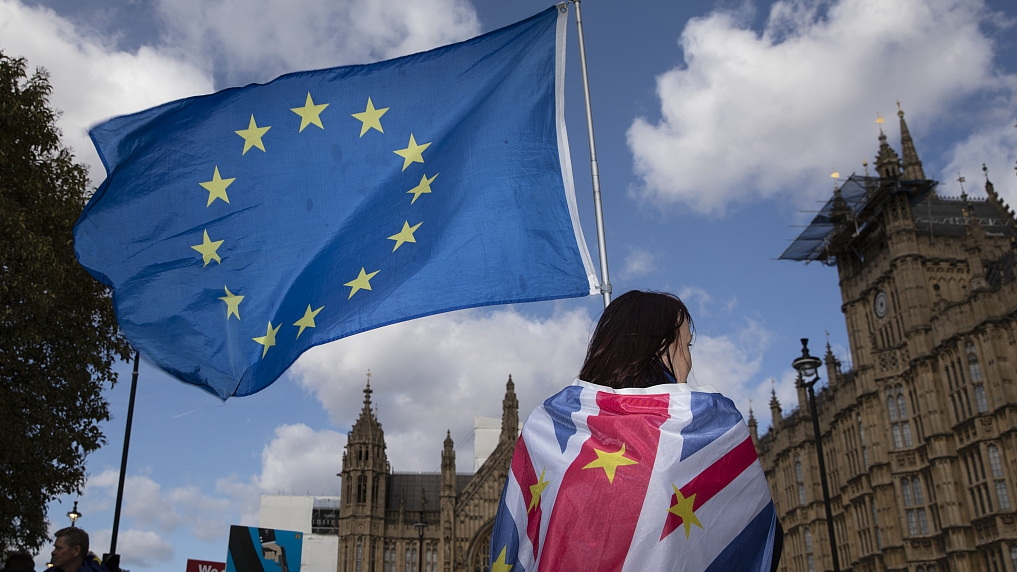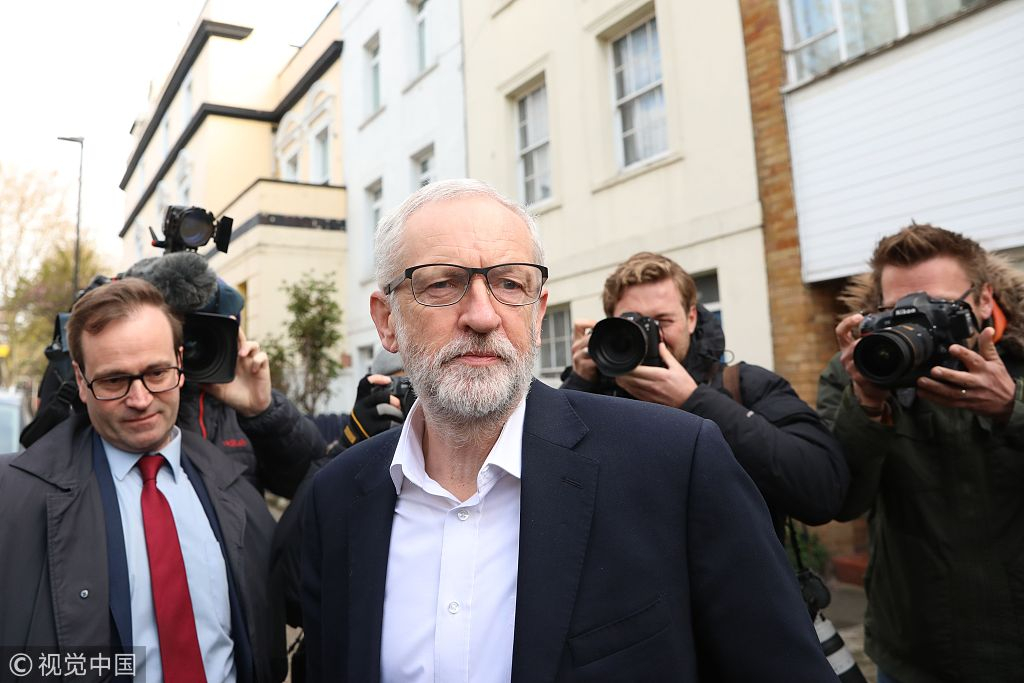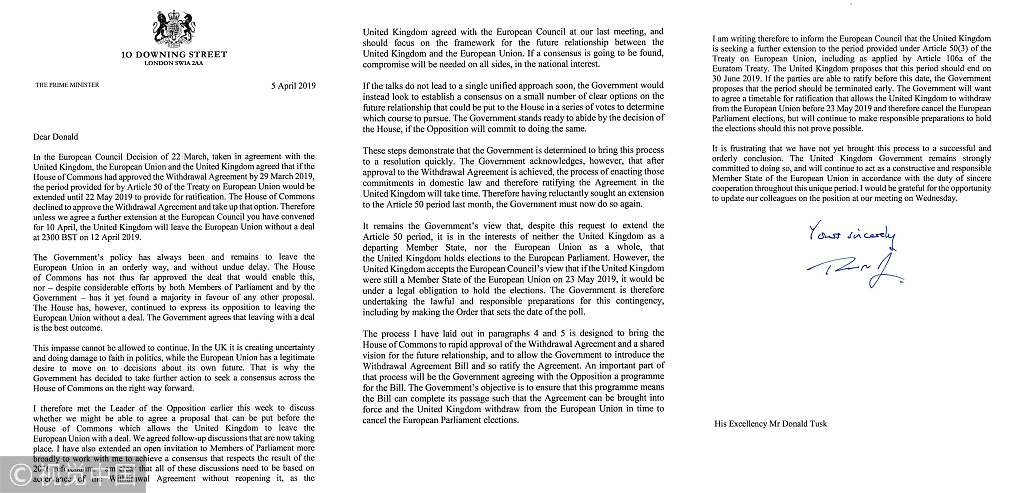
Opinion
16:44, 06-Apr-2019
The Brexit extension to nowhere
Tom Fowdy

Editor's note: Tom Fowdy is a British political and international relations analyst and a graduate of Durham and Oxford universities. He writes on topics pertaining to China, the DPRK, Britain, and the U.S. The article reflects the author's opinion, and not necessarily the views of CGTN.
On Friday British Prime Minister Theresa May wrote to European Leaders requesting a delay to Britain's departure date up until the June 30, aiming to get her withdrawal agreement ratified by the House of Commons before that time. It is reported that President of the European Council Donald Tusk will respond to the measure by offering a “one-year flexible extension” to Brexit with an ability to cut it short if the deal can be passed in that time frame.
As Downing Street scrambles to break the gridlock, it has simultaneously been engaging in negotiations with the Labour party in an effort to make compromises to the deal which would allow it to foster cross party support. Such talks, however, have not yet yielded results so far – and the prospects are unlikely.
With the prime minister's approach continuing to rest largely on wishful thinking, the latest developments do not change a great deal. The prospect of a shorter extension, designed in an attempt to avoid European elections, is not in the interest of European Union countries given the prime minister's total inability to build domestic support for the agreement.

Opposition Labour party leader Jeremy Corbyn leaves his home in north London on April 3, 2019. Corbyn said he would be "very happy" to sit down with Prime Minister Theresa May and discuss a joint Brexit policy that could resolve the current impasse./VCG Photo
Opposition Labour party leader Jeremy Corbyn leaves his home in north London on April 3, 2019. Corbyn said he would be "very happy" to sit down with Prime Minister Theresa May and discuss a joint Brexit policy that could resolve the current impasse./VCG Photo
Thus, with Europe proposing a longer extension, negotiations with the Labour party are now even less likely to succeed as it will increase the leverage of the opposition and allow them to further drag things out at the political expense of the government. Given this, unless there are drastic changes to the status quo, prospects of a short delay are unrealistic and the outcome of an increased limbo, intensifies.
In asking European Union leaders for a short extension, Theresa May is not being realistic. She is of course, acting to save her own political face. The current situation as it is has seen her political support nosedive and Conservatives react with anger and disbelief. This has rendered her completely unable to consider acts which would involve drastically changing course and thus conceding defeat on her political platform altogether. Given such, she has stuck to the withdrawal agreement stubbornly and maintained an insistence that at some point she can get it through despite the obvious problems at hand.
The EU itself of course is not buying this logic. A shorter extension in the midst of such obvious political failures on behalf of the UK government is not a serious solution to the Brexit issue. For them, it's a poorly judged gamble which simply prolongs uncertainty, disruption to business and a huge headache to the European Union agenda.
If you will, a glorified “Kicking the can down the road.” If they are to grant Theresa May what she wishes and then more than likely, the deal can't be passed, then the cycle repeats and Article 50 has to be extended yet again. It is nothing but a huge inconvenience. As a result, President of the European Council Donald Tusk is reportedly offering a year-long extension, with the option of the UK leaving as soon as it can pass the agreement.
This of course, is bad news for Theresa May's negotiations with the Labour party. Already, talks between the government and the opposition are not going well. It is only natural that in such a scenario Jeremy Corbyn would have to demand enormous concessions in order to neutralize the enormous political costs of negotiating with their political rivals, such which has reportedly included a demand for a second referendum.

A copy of a letter from Britain's Prime Minister Theresa May, to European Council President, Donald Tusk, regarding Brexit in London, Britain April 5, 2019. /VCG Photo
A copy of a letter from Britain's Prime Minister Theresa May, to European Council President, Donald Tusk, regarding Brexit in London, Britain April 5, 2019. /VCG Photo
Early results show the government have not been willing to offer any concessions in their position. While May's logic is that the two parties should come together in the midst of a national crisis and find concessions, if Europe moves to impose a longer extension on Britain that notion will, in fact, be undermined.
Why so? Because in such a scenario the risk of a no deal and the subsequent disasters which would follow are removed, meaning Labour does not have to concede its position to salvage the country.
Instead, it becomes politically convenient for them to drag their feet, undermine the government and exploit their political weakness for their own gain, which is, of course, a staple of UK opposition politics. With Labour opposed to Brexit as a whole and now turning towards making much softer demands, they have no qualms about a longer delay and instead, can be placed in the driving seat.
Thus, if Tusk follows through with his yearlong ultimatum, then we can expect Labour-Conservative talks to collapse with the former likely again upping the ante for May to call a general election.
So really, none of the new developments are a serious game changer. The prime minister's unwillingness to consider new or flexible options continues to be the sticking point. It is this very sticking point which will ensure demands for a short Brexit extension until June 30 are not met with great enthusiasm, and instead, Europe are going to opt for something which induces stability and moves the bloc out of the crisis zone.
Given this, the idea that the government can somehow lean on the opposition to salvage and mop up their political failures resembles an act of desperation, than a strategy. Theresa May is ensuring the UK will remain locked in Europe without direction for a long time yet.
(If you want to contribute and have specific expertise, please contact us at opinions@cgtn.com.)

SITEMAP
Copyright © 2018 CGTN. Beijing ICP prepared NO.16065310-3
Copyright © 2018 CGTN. Beijing ICP prepared NO.16065310-3